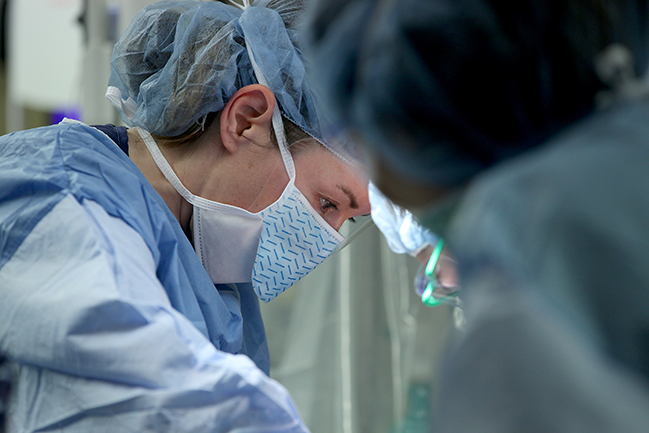For a split second, the ER is totally silent.All eyes – and there are a lot of them: nurses, doctors, techs, an EMT standing just off to the side – are trained on Heather Evans, M.D., MS. On the table in front of the seasoned trauma surgeon is a young man with a gunshot wound to the chest. His body is motionless. There is no breathing. No heartbeat.
CPR does nothing.
So she plays the only card she has left. She cuts him open and begins giving him compressions – directly on the heart. Her lips don’t move, but the rhythmic motion of her shoulders count out loud.One. Two. Three. Four. Five.And she brings him back.
They’re all moving again now. Talking. Shouting. A nurse calls for an IV bag. Monitors in the corner make computerized cries for help.
Evans shouts to a resident to take her place – “put your hands right here where mine are” she says – and they’re wheeling him toward the elevator.
A cluster of nurses and doctors cram in – “Push the 4, push the 4!” – encircling the patient as the doors close, rapidly ascending to surgical trauma OR.
It’s 5:52 a.m. and Evans has been on her feet for 14 consecutive hours. There’s been a car crash, a ladder fall, a drunk man who picked a fight with a plate-glass window. The only thing Evans hasn’t seen during this shift is sleep.
Welcome to the dice roll of the on-call trauma surgeon: sometimes it’s oddly quiet, sometimes it comes up snake eyes. According to the National Center for Injury Prevention and Control, trauma is the leading cause of death for people under the age of 45.
In the United States alone, it accounts for over 150,000 deaths. In other words, Evans and her colleagues are a busy bunch.In 2012, MUSC was recognized by the American College of Surgeons as a Level 1 Trauma Center, the first in the state bestowed with the honor. Trauma centers are ranked as Level 1, 2 or 3, depending on the level of care they can provide, according to the S.C. Department of Health and Environmental Control.
In order to achieve that designation, Level 1 centers must have trauma surgery, anesthesia and operating room capabilities available at all times. MUSC checks all the boxes. And thanks to folks like Evans, even the craziest, most out-of-control days have silver linings.
Miracles big and small. A toe that can now wiggle. A trip outside for fresh air. Some even smile as they get to go home, a second chance granted.

